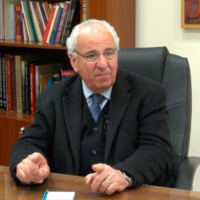
Καθ. Κυριάκος Κομβόπουλος
Professor Komvopoulos has been in the faculty of the Department of Mechanical Engineering at the University of California, Berkeley (UCB) since 1989. Before joining UCB, he was in the faculty of the Department of Mechanical and Industrial Engineering at the University of Illinois at Urbana-Champaign (1986-1989). Professor Komvopoulos is internationally known for pioneering research in surface nanosciences and nanoengineering, with important implications in several emerging technologies including communications, microelectronics, information storage, and biotechnology. He is the founder and director of the Surface Sciences and Engineering Laboratory (SSEL) and the Computational Surface Mechanics Laboratory (CSML) and holds the positions of Professor of Mechanical Engineering at UCB, Faculty Scientist, Materials Sciences Division, Lawrence Berkeley National Laboratory (LBNL), Principal Investigator, The Berkeley Stem Cell Center, and Principal Investigator, Center for Information Technology in the Interest of Society (CITRIS).
The research of Professor Komvopoulos is at the interfaces of mechanical and electrical engineering, materials sciences, surface physical chemistry, bioengineering, and biology. His work is characterized by a multidisciplinary nature and the combination of analytical and experimental techniques used to analyze complex surface and interface phenomena. His research is based on the integration of fundamentals from mechanics, materials, surface chemistry, and biology, and spans a broad range of scales, from the mesoscopic to the atomic and molecular levels.
Early research accomplishments of Professor Komvopoulos include contact deformation at submicron scales, new friction theories of surfaces interacting in the presence of physicochemically adsorbed monolayers, surface plasticity and fracture of contacting bodies, acoustic emission in surface sliding and machining, synthesis and characterization of ultrathin diamondlike and amorphous carbon films, adhesion forces in miniaturized electromechanical systems, and rheological behavior of boundary films.
In the past two decades, Professor Komvopoulos broadened his research activities, branching into the exploration of various surface microprobe techniques for atomic and molecular level surface analysis, synthesis of self-assembled organic monolayers for reducing adhesion between silicon microdevices, invention of plasma-assisted surface treatments for biopolymers (used in total joint replacements, catheters for minimally invasive treatment of diseased arteries, and cell platforms), deposition of ultrathin (a few atomic layers) amorphous carbon films by sputtering and filtered cathodic vacuum arc for ultrahigh-density magnetic recording and heat-assisted magnetic recording, phase transformations and nanomechanical properties of shape-memory alloys (both in thin-film and bulk form) for retina disks and artery stents, a surface-specific spectroscopy technique (infrared-visible sum frequency generation (SFG) vibrational spectroscopy) for in-situ studies of entropically driven molecular rearrangement at various biopolymer surfaces due to in-plane and out-of-plane stretching and aging effects.
Professor Komvopoulos’ most recent work includes plasma-assisted polymer surface functionalization for controlling adhesion and growth of cells, protein secretion due to mechanotransduction in articular cartilage, cell mechanics, patterned media for single-cell growth, and cell infiltration into fibrous scaffolds synthesized by electrospinning, new electrode materials for lithium-ion batteries, flexible and stretchable bioelectronics, skin mechanics, and transdermal drug delivery by microneedle arrays, mechanics of biological surfaces, and synthesis of scaffolds with special cues for enhanced biofunctionality.
Professor Komvopoulos’ research is documented in 379 publications consisting of 277 papers published in peer-reviewed archival journals, 71 papers in refereed conference proceedings, 19 papers in symposium proceedings, 2 book chapters, 65 technical reports, and 10 US patents. As of June 2021, Professor Komvopoulos’ publications and patents have been cited more than 13,750 times (h-index = 62, Google Scholar). He has also authored an undergraduate-level textbook (Mechanical Testing of Engineering Materials) and co-authored two monographs (1999 Interface Tribology Towards 100 Gbit/in2; Long Term Durability of Structural Materials: Durability 2000). He has given 225 scholarly presentations at various international conferences, academic institutions, national laboratories, industries, and various media, supervised the research and dissertations of 58 graduate students (33 PhD and 25 MS) and 17 post-doctoral students, visiting faculty, and industry fellows, and consulted with a wide range of industries and law firms on various litigation matters.
Professor Komvopoulos has been elected to the grade of Fellow of STLE (2004) and ASME (2000) and has been the recipient of several awards, including NSF Presidential Young Investigator Award (1989-1996), IBM Faculty Development Award (1990-1992), Berkeley Engineering Fund Award (1989-1990), ASME B. L. Newkirk Award (1988), and NSF Engineering Initiation Award (1987).
At UCB, Professor Komvopoulos teaches undergraduate and graduate courses on Mechanical Behavior of Materials, Plasticity, Fracture, Fatigue, and Tribology and devotes significant time to administration duties at the Department, College, and University system-wide levels. His most recent system-wide committee service includes UC Faculty Welfare, Assembly Representative, Divisional Council, Educational Technology, Courses of Instruction, Graduate Study, and Committee on Academic Planning and Resource Allocation.
Research Description:
Theoretical and numerical studies in nano-/micro-scale contact mechanics, tribology, mechanical behavior of bulk and thin-film materials, deposition and characterization of single and multi-layer ultrathin films by sputtering and filtered cathodic vacuum arc methods, reliability of micro-electro-mechanical systems (MEMS), surface force microprobe techniques, surface modification of biopolymers, surface chemical functionalization for enhanced biocompatibility and cell activity, mechanotransduction effects at the single-cell and tissue levels, scaffolds for tissue engineering, and flexible/stretchable bioelectronics.
To learn more about Professor Komvopoulos’ research, please click here.
To view a list of Professor Komvopoulos’ supervised current and past graduate students and visiting scholars, please click here.
Key Publications:
To view a list of Professor Komvopoulos’ publications, please click here.















